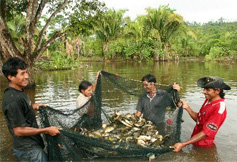EU highlights trade-led growth as central to modern development agenda

A range of proposals to make trade and development instruments work hand-in-hand to ensure real poverty reduction across the world are presented by the European Commission today. The proposals aim at reinforcing the trade capacities of developing countries by making trade part of their development strategy. And to ensure we hit our target, the EU is currently looking into better ways of differentiating between developing countries to ensure the world's poorest countries receive our biggest help. The role of trade is underlined in the proposal as one of the key drivers to support development, stimulate growth and to lift people out of poverty. Furthermore, today the EU calls for all developed economies to match its significant levels of market access to developing countries.
While the EU already provides more trade-related development assistance than the rest of the world put together, the Communication "Trade, growth and development" assesses the main next steps. For example: the traditional group of "developing countries" is outdated amid the rise of emerging economies. More tailor-made trade and development policies are needed that go beyond reducing customs duties at borders (tariff reductions), and tackle the major problem of improving the 'business environment'.
To achieve this goal, the proposal underlines that developing countries' leadership must also face up to their responsibilities. Developing countries need to undertake domestic reforms to ensure that the poor do indeed benefit from trade-led growth.
The Commission proposes a number of ways to improve the effectiveness of EU trade and development including:
- reforming the EU's preferential trade schemes to focus more on the poorest countries,
- stepping up negotiations on free trade agreements with our developing country partners. These must look beyond tariffs to tackle the real barriers to trade,
- increasing the use of EU instruments to promote foreign direct investment, including relevant provisions in free trade agreements to enhance legal certainty and combining EU grants with loans or risk capital to support the financial viability of strategic investments,
- facilitating developing country exporters, especially small operators, to enter the EU,
- assisting developing countries to improve their domestic business environment, meet international quality, labour and environmental standards and take better advantage of trade opportunities offered by open and integrated markets,
- using trade measures to help mitigate the effects of natural disasters and tackle conflict catalysts, including in mining activities.
It also calls on emerging economies to assume more responsibility for opening their markets to LDCs through preferential schemes but also on a non-discriminatory basis towards the rest of the WTO membership, of which four-fifths are developing countries. At the same time, the EU offers emerging economies a more mature partnership that includes regulatory cooperation and engagement on global issues which are essential for development such as food security, sustainable use of natural resources, green growth and climate change.
For more information:















